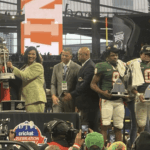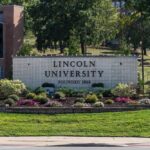
Preacher’s kid takes on Silicon Valley
Chuck Faush grew up watching his father, a prominent Birmingham pastor, fight for his community. Now the Miles College executive has found his own mission field: making sure Black students don’t get steamrolled by the artificial intelligence revolution.
At a recent Morehouse College conference, Faush delivered a stark warning. Tech giants and elite universities are writing the rules for AI’s future, and historically Black colleges and universities risk being shut out completely.
“This is the wild, wild west of technology being shaped by those who speak up about it now,” Faush told rolling out. His message is simple: speak up now, or get left behind forever.
Don’t fear the robots, outsmart them
Faush has heard all the AI horror stories. Robots stealing jobs. Machines taking over the world. But he’s not buying the panic.
“People were afraid of the first computer when it was bigger than this room. Now we hold it in our hands,” he said. “My dad used to ask, ‘Why do I need a phone outside of the house?’ People were afraid of that too.”
His advice? Get smart with AI instead of running from it.
“If we recognize the fact that it’s smarter than us, how do you take that fear and learn as much as you can about it, so that you can be responsibly active with it?” Faush asked.
The real danger isn’t AI itself. It’s letting other people control it while Black students watch from the sidelines.
Turning big dreams into real money
Four years ago, Faush got tired of watching brilliant HBCU students graduate with amazing ideas and zero resources to make them happen. So he created The Yard, a competition that hands out scholarships and grants to student innovators.
“When you have an idea, and you have no resource, it’s still an idea,” Faush explained.
The program targets students who are “future leaders, influencers, innovators, thought leaders who really shaped us, but we don’t give the credit to because they’re still in school.”
It’s not just about the money. The Yard connects students with mentors, networks, and real-world experience that textbooks can’t teach.
Same old problem, higher stakes
Ask Faush what’s holding back HBCU students, and he’ll give you the same answer that’s been true for decades: money.
“I think the same problems that existed, I’ll call it then, are the same problem now. Lack of resource. When I say resource, I mean, you know, access to capital,” he said.
But now the stakes are higher. AI research needs expensive computers, specialized equipment, and expert professors that most HBCUs can’t afford. Fall behind now, and these schools might never catch up.
Preaching the tech gospel
When the conversation gets heavy, Faush’s preacher’s kid roots show. He quotes 1 Corinthians: “One plants, another waters; God gives the increase.”
“The ground is our HBCUs. The seeds are the students,” he explained. “And the fertilizer that you’re asking about is not simply access to capital; it is pairings.”
Money helps, but students also need mentors, experience, and connections. Faush calls it giving your “time, talent, treasure and tithe” — everything you have to offer.
“You give somebody a scholarship. But if you don’t give them the experience, there’s no application, right? There’s intelligence, but there’s no application,” he said.
His mission is personal. “Everything that was sowed back in me, I’m going to sow it right back out.”
How to help the cause
Want to support Faush’s mission? Check out emaginenow.com. But he’s not just looking for donations.
“The biggest thing is really just to get in where you are,” Faush said.
Whether you’re a tech executive, recent graduate, or someone with connections, there’s a way to help HBCU students navigate the AI revolution. The future belongs to those who show up now — and Faush is making sure his students have a seat at the table.
Sort By
 Register for exclusive access to VIP events and more
Register for exclusive access to VIP events and more
Sign up for periodic updates, special discounts, and more!





















